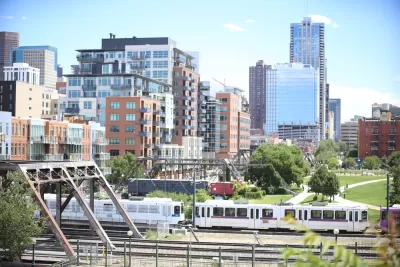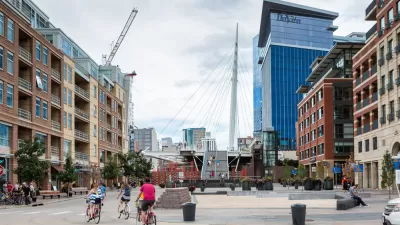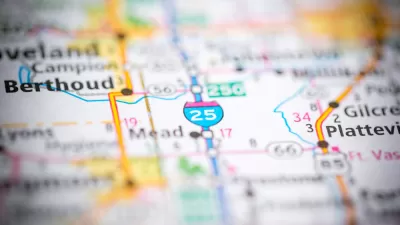Multiple funding plans are on the brink of reformulating the state of Colorado’s approach to transportation—away from cars and toward active transportation and high-capacity public transit.

“Rewrites of Colorado’s statewide 10-year priority project plan and two Front Range regional transportation plans are nearing adoption in the next month,” reports Jon Murray for the Denver Post.
“Especially in metro Denver, they shift big money from expanding pavement to other projects that make it easier, and safer, to travel on public transportation, on bike or on foot.”
The Denver Regional Council of Governments’ 2050 regional transportation plan, one of the plans up for approval this month, would speed up plans for bus rapid transit along busy arterial streets (see previous Planetizen coverage of the DRCOG’s 2020 regional transportation plan). “In the proposed update, those plans have been accelerated — with five projects now set out by 2030 along East Colfax Avenue in Denver, long in planning; a Colfax extension through Aurora; and long stretches of Federal Boulevard, Colorado Boulevard, and Colorado 119 between Boulder and Longmont. More rapid bus corridors would follow in the 2030s,” reports Murray.
Other plans include an updated 2045 regional plan by the North Front Range Metropolitan Planning Organization, which covers a region including Fort Collins and Greeley, and an update to the state’s ten-year project plan, under consideration his week by the Colorado Transportation commission.
Murray gives credit for the shift in transportation funding priority to legislation, SB21-200, approved by the Colorado State Legislature and signed by Governor Jared Polis last year. The Colorado Transportation Commission has already adopted new greenhouse gas emissions rules enabled by that legislation.
FULL STORY: More rapid bus lines, fewer highway expansions: New plans for metro Denver set shift in project funding

Alabama: Trump Terminates Settlements for Black Communities Harmed By Raw Sewage
Trump deemed the landmark civil rights agreement “illegal DEI and environmental justice policy.”

Planetizen Federal Action Tracker
A weekly monitor of how Trump’s orders and actions are impacting planners and planning in America.

The 120 Year Old Tiny Home Villages That Sheltered San Francisco’s Earthquake Refugees
More than a century ago, San Francisco mobilized to house thousands of residents displaced by the 1906 earthquake. Could their strategy offer a model for the present?

In Both Crashes and Crime, Public Transportation is Far Safer than Driving
Contrary to popular assumptions, public transportation has far lower crash and crime rates than automobile travel. For safer communities, improve and encourage transit travel.

Report: Zoning Reforms Should Complement Nashville’s Ambitious Transit Plan
Without reform, restrictive zoning codes will limit the impact of the city’s planned transit expansion and could exclude some of the residents who depend on transit the most.

Judge Orders Release of Frozen IRA, IIJA Funding
The decision is a victory for environmental groups who charged that freezing funds for critical infrastructure and disaster response programs caused “real and irreparable harm” to communities.
Urban Design for Planners 1: Software Tools
This six-course series explores essential urban design concepts using open source software and equips planners with the tools they need to participate fully in the urban design process.
Planning for Universal Design
Learn the tools for implementing Universal Design in planning regulations.
Clanton & Associates, Inc.
Jessamine County Fiscal Court
Institute for Housing and Urban Development Studies (IHS)
City of Grandview
Harvard GSD Executive Education
Toledo-Lucas County Plan Commissions
Salt Lake City
NYU Wagner Graduate School of Public Service





























